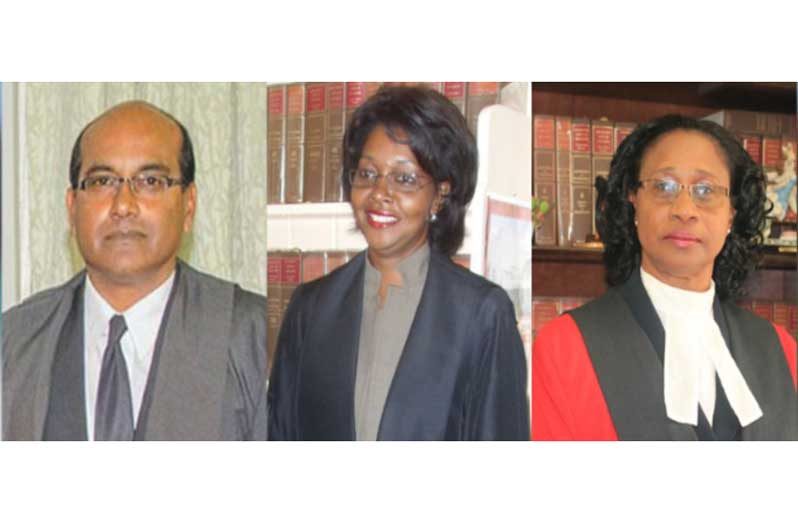–reduces parole eligibility from 35 to 20 years
THE Court of Appeal unanimously decided to uphold a man’s life sentences and rape convictions, but shortened his parole eligibility period from 35 to 20 years.
After a jury returned guilty verdicts in 2017 regarding a case concerning a girl who was raped while she was between the ages of six and eight, Justice Simone Morris-Ramlall of the Demerara High Court imposed two life sentences on the perpetrator, Michael Abrams.
Abrams was found guilty of the first and second counts of rape, which happened sometime between January 1, 2013 and January 19, 2016.
The jury reached unanimous verdicts on both charges. Abrams was given life sentences to be served concurrently in prison for both charges. Moreover, the trial court stipulated that he must serve a minimum of 35 years before he may be granted parole.
Discontented with the jury’s decisions, Abrams, through his lawyer Glenn Hanoman, contested his convictions and jail sentences, asking that they both be set aside. Abrams argued that his convictions were unsafe, and that the sentences imposed by the trial judge were manifestly excessive and not in keeping with established sentencing guidelines.
Among the grounds of appeal submitted by Abrams was that a miscarriage of justice was caused by the trial judge’s failure to present his defence to the jury “fairly and /or adequately or at all”, referencing what he said was excessive questioning and interruptions by the judge.
As for the evidence itself, he contended that the judge “wrongly admitted fresh, inadmissible hearsay” that was “extraneous and highly prejudicial” to him and that it negatively reflected his character. The evidence in question comes from a prosecution witness who stated that Abrams had a history of committing sexual offences due to his touching of a woman’s breasts.

While the court felt that the prosecution should not have led the evidence regarding the fondling of the breasts, Justice Yonette Cummings-Edwards, Chancellor of the Judiciary (ag), read the opinion of the appeal court and stated that the evidence was admissible under the Evidence Act.
“We believe that the prosecution should not have led the evidence in relation to the fondling of the breasts. But the trial judge’s intervention and direction to the jury were adequate in the circumstances. The directions given by the trial judge when taken as a whole show that the accused was not prejudice. The good character directions given by the trial judge was sufficient in the circumstances. And therefore, we don’t feel there is much merit in this ground of appeal.”
In support of his defence, the Chancellor said that Abrams provided strong character evidence, including his earlier untarnished criminal record and his experience working with children in church and scouting groups, both of which were free from claims of inappropriate behaviour.
Additionally, the court rejected the convict’s argument that there was a miscarriage of justice as a result of the trial judge’s failure to present his defence fairly to the jury.
“We find that there were interventions by the trial judge. However, these interventions did not have an impact on the conduct of the trial. The judge is not expected to be a silent witness to the proceedings. He/she could and must ask questions in an effort to clarify the evidence or to clear any point that has been overlooked or left obscured.
“The trial judge could not be faulted for carrying out her role to ensure that a fair trial has been conducted. We find, therefore, that there was no excessive questioning or interruption that would have affected the conduct of the defence,” Justice Cummings-Edwards held.
The outcome of the case would have been the same even if the breast-fondling evidence had not been introduced, the Chancellor emphasised. As such, Abrams’s convictions were affirmed.
Regarding sentencing, the Court of Appeal determined that the life sentences “should remain but with the eligibility of parole being tied to 20 years” due to the circumstances of the case, including the age of the complainant, and the fact that she had been sexually assaulted numerous times.
Additionally, the rapist received full credit for time already served.
Testimony of Abrams sexually penetrating the child was revealed during the trial that was held in-camera. The convict was arrested after the girl confided in her teacher about what had happened.
Judge Morris-Ramlall had reprimanded Abrams for his transgressions, saying, “You say you are a devoted Catholic, I hope you pray to God and ask forgiveness.”
In addition to the Chancellor, Justices of Appeal Dawn Gregory-Barnes and Rishi Persaud also considered Abrams’ case. Diana Kaulesar-O’Brien, an Assistant Director of Public Prosecutions, made an appearance on behalf of the State.



.jpg)








